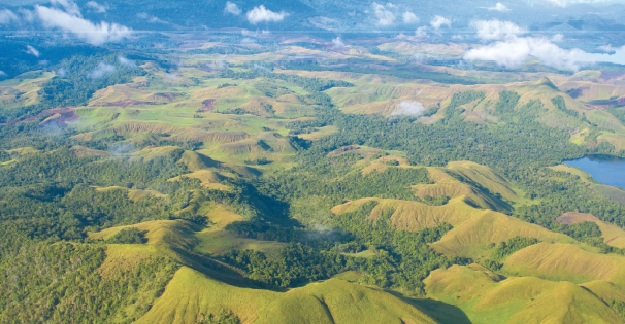After an unseemly period of competition between two rivals for high office, Papua New Guinea made a fresh start with its elections of mid-2012 and there are hopes of achieving greater political stability as the new prime minister vows to tackle corruption in a move to turn around the country’s economic fortunes.

Ruling without a guaranteed parliamentary majority has been a hazard of political life for all Papua New Guinea’s prime ministers since independence in 1975, and the current incumbent, Peter O’Neill, is no exception. His initial rise to office in 2011, followed by his success in the latest elections of June/ July 2012, all in all amounted to an unusually tricky initiation, but this may at least have helped to consolidate his authority.
O’Neill now says he hopes to enhance Papua New Guinea’s shaky reputation for political stability and to start to tackle its endemic corruption.
In late 2011, the country was in the bizarre political situation of having two prime ministers. Although O’Neill had been chosen by parliament while his predecessor, Sir Michael Somare, was having prolonged medical treatment in Singapore and was considered unfit to rule, once Somare returned home he asserted that he’d been wrongfully dismissed and that he was still in charge.
After a difficult stand-off, which put the parliament at odds with the Supreme Court, O’Neill managed to prevail, and the elections finally resolved the matter in his favour. Once it was clear that his People’s National Congress Party had won 27 seats, more than any other party in the 111-member parliament, O’Neill was able to persuade Somare’s National Alliance Party, with its seven seats, to join a broad coalition. The reconciliation then received the blessing of Somare and two other former prime ministers.
The prime minister is now backing a new law to guarantee a period of 30 months before a government can face a no-confidence motion, in place of the current 18 months. Although elections are held only every five years, in the past some governments have been challenged in parliament after only six months in office. “This has not created stability at all,” O’Neill told the National Press Club in Canberra during a visit to Australia. “It does not give confidence to any investor.”
Corruption is a big issue in Papua New Guinea and one of the ‘three Cs’ – corruption, crime and compensation – hotly debated at social gatherings.
Payments made corruptly range from coins slipped to petty bureaucrats or village officials to big sums deposited in senior officials’ foreign bank accounts. Foreign company representatives say it’s a cost of doing business.
O’Neill has described corruption as a “cancer” that has to be eradicated, arguing that it “undermines efforts to maintain political stability and social cohesion”. He promises to establish an independent anticorruption commission.
Although successive political leaders have promised much the same without significant alteration to the social fabric, this time there is optimism in Port Moresby that the prime minister means business. The corrupt are growing nervous and there is less complacency.
Over the past year, a special task force has been investigating reported cases of corruption and looking into some 170 complaints involving around US$1 billion in public funds.
The second ‘C’ – crime – has mostly to do with so-called raskol (pidgin for ‘rascal’) gangs, which attract village youths as foot-soldiers. Gangs are commonly involved in opportunistic street crime such as muggings and burglaries as well as the drug trade, ensuring that after-dark ambling in Port Moresby and other major towns is a high-risk activity. Crime levels are blamed for stunting economic development, particularly in tourism. Developed nations routinely classify Port Moresby as a hardship posting for officials.
The impact of crime has fuelled resurgent discussion of the death penalty. The last person hanged was a convict executed by colonial authorities in 1954 for murdering another prisoner. Attorney-General and Justice Minister Kerenga Kua is trying to foster debate on the issue, telling parliament that “courts are slowly warming to the idea of imposing the death penalty… in the hope it can act as a deterrent”. Much talk centres on the comparative costs of different types of execution.
In discussing solutions to the crime problem, experts point out that it helps to understand the country’s strong tradition of tribal pride, which is highly regarded in Papua New Guinea. In what’s called the wantok (‘one talk’) system, people in towns speak fondly of “my wantok“, meaning someone from the same village or tribal area, with the implication that a wantok is a trustworthy person.
When young people leave villages to try their luck in town, elders remind them to contact wantoks, who are obliged to assist them and act as guardians, helping ensure the newcomers don’t drift into bad company and become raskols.
And the third ‘C’, compensation? It’s a centuries-old custom with agrarian origins where, if a person or village wrongs another person or village, compensation – typically a pig, other livestock or crops – is paid.
Compensation disputes still spark violent tribal clashes. A modern spin has groups of villages combining to obtain compensation from multinational mining companies for pollution, other environmental damage or relocation. The most celebrated instance was in Bougainville, where one of the world’s largest copper, gold and silver open-cast mines was forced to close. Peace agreements, which were signed in 2001 and which promised greater local autonomy, were heralded as a precursor to a referendum (so far not held) on separation. Some compensation was paid to local landowners – the amounts were not revealed – while unconfirmed rumours circulate periodically that the mine may reopen.
There is no shortage of challenges awaiting the attention of Prime Minister O’Neill, and his success in dealing with them will be closely watched, not least by his fellow parliamentarians.





